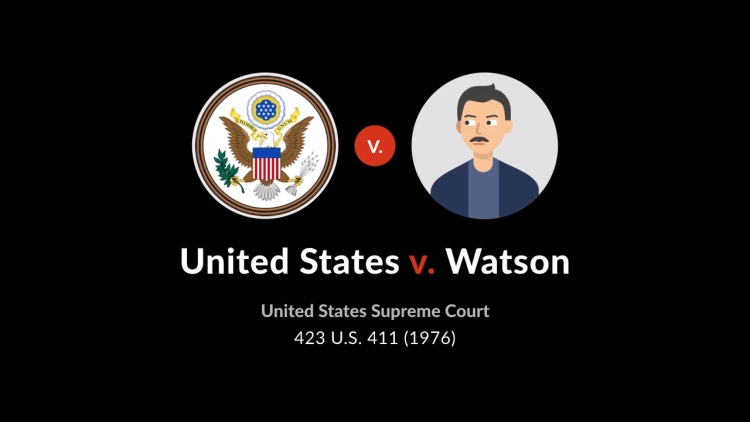United States v. Watson
United States Supreme Court
423 U.S. 411, 96 S. Ct. 820, 46 L. Ed. 2d 598 (1976)
- Written by DeAnna Swearingen, LLM
Facts
On August 17, 1972, a reliable informant alerted a postal inspector that Watson (defendant) had a stolen credit card. The informant gave the card to the inspector and agreed to set up a meeting with Watson. During the meeting, the informant signaled that Watson had more stolen cards. Police arrested Watson, read his rights as required by Miranda v. Arizona, 384 U.S. 436 (1966), and asked to search his car. Watson said “go ahead” and repeated that officers could “go ahead” with the search even after an officer told him that anything found in the car would “go against” Watson. Watson gave officers the keys to the car, and officers found two stolen credit cards inside the car. Watson was charged with possessing stolen mail. Before trial, Watson moved to suppress the evidence found in the car. He claimed that the warrantless arrest was invalid and that his consent to search the car was involuntary and ineffective because he was not informed that he could withhold consent. The trial court denied the motion, and Watson was convicted. The appellate court reversed, holding that the warrantless arrest of Watson was unconstitutional and that Watson’s consent to search the car was coerced and thus invalid. The United States Supreme Court granted certiorari.
Rule of Law
Issue
Holding and Reasoning (White, J.)
Concurrence (Stewart, J.)
Concurrence (Powell, J.)
Dissent (Marshall, J.)
What to do next…
Here's why 904,000 law students have relied on our case briefs:
- Written by law professors and practitioners, not other law students. 47,100 briefs, keyed to 995 casebooks. Top-notch customer support.
- The right amount of information, includes the facts, issues, rule of law, holding and reasoning, and any concurrences and dissents.
- Access in your classes, works on your mobile and tablet. Massive library of related video lessons and high quality multiple-choice questions.
- Easy to use, uniform format for every case brief. Written in plain English, not in legalese. Our briefs summarize and simplify; they don’t just repeat the court’s language.





